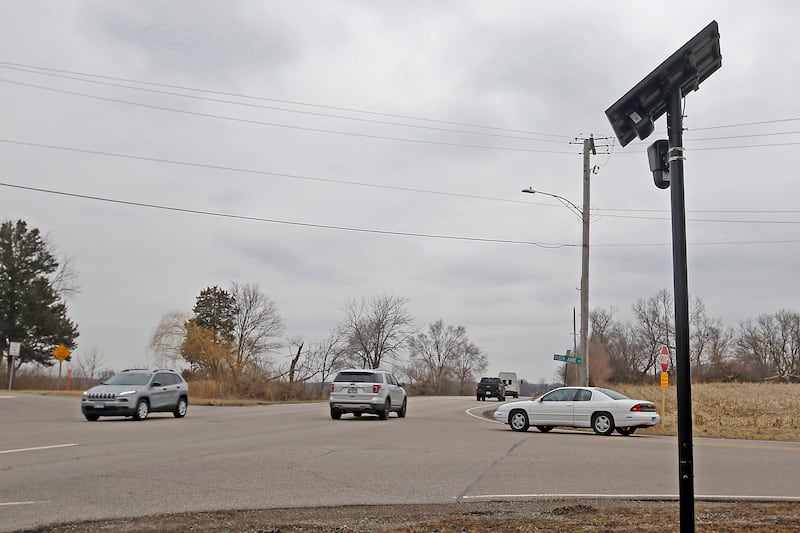CHICAGO – An automatic license plate reader company used by hundreds of police departments around Illinois broke state law by allowing federal border enforcement officers to access Illinois license plate camera data, Illinois Secretary of State Alexi Giannoulias said.
The company, Flock Safety, was also allegedly used by out-of-state police earlier this year to look for a woman who recently had an abortion. That situation sparked the secretary of state’s office to audit Flock.
License plate readers are cameras which can automatically detect the license plate, make, model and other details of cars while they’re driving. These details are logged and entered into a database that can be searched and shared between law enforcement agencies, governments and private companies.
A 2023 state law, which was backed by Giannoulias, prohibits operators of license plate readers from sharing the data they collect for the purpose of enforcing immigration or abortion-related laws.
Giannoulias alleges that Flock gave U.S. Customs and Border Patrol access to Illinois data as part of a pilot program. Flock also didn’t have any safeguards to prevent other out-of-state police from violating Illinois’ license plate reader law, Giannoulias said.
[ Read more: Illinois license plate cameras used illegally by out-of-state police, Giannoulias says ]
Giannoulias said the company’s actions “put them in direct violation of Illinois law” in a video statement Monday.
“We will not tolerate any violations to our data sharing and privacy laws,” Giannoulias said. “Moving forward, we encourage local law enforcement to closely examine their relationship with Flock and ensure that their use of this technology is compliant with the law.”
The law prohibiting this kind of data sharing does not contain any specific penalties for violating it.
Giannoulias’ office told Capitol News Illinois it is “conducting an investigation” into the matter. The office has been in talks with the state’s attorney general, although it declined to describe specifics.
At least one city, Evanston, has deactivated its Flock cameras and begun the process of canceling its contract with the surveillance company. In a statement, the city called the situation “deeply troubling.”
A spokesperson for Flock, meanwhile, said that they were unaware of any ongoing investigation and that the company disagreed with the secretary of state’s legal assertions.
“We clearly communicated poorly,” Flock CEO Garrett Langley wrote in a blog post earlier this week. “We also didn’t create distinct permissions and protocols in the Flock system to ensure local compliance for federal agency users.”
In that statement, Langley said the company had paused all pilot programs with federal agencies. Langley also said he tasked the company’s top lawyer with overseeing the rollout of new compliance tools.
Flock cameras’ prevalence
Flock does not disclose its customers, but a database based on news reports and company statements assembled by the Electronic Frontier Foundation found about 90 police departments in Illinois that are confirmed to use Flock cameras.
Flock customers can elect to share information about their system through pages hosted by the company that disclose what types of information is collected, how many vehicles have been detected by their system and how long data is stored.
Police departments can disclose what other law enforcement agencies have access to the data collected by their cameras. In Illinois, at least 27 police departments disclose information in this way, including 14 which list the other agencies that have access to their data.
More than 461 police departments, prosecutors, dispatch agencies, state universities, transit agencies and railroads in Illinois had access to Flock data, according to these disclosures. All of the transparency reports have been updated within the past week.
The attorney general’s office and Illinois State Police both have access to Flock data. ISP pays the company about $50,000 per year, according to state records. The agency can access Flock’s data for investigations but doesn’t operate any Flock cameras and doesn’t share its own data with Flock, according to an ISP spokesperson.
While license plate reader cameras are frequently associated with the Chicago region – in part due to a major state-backed program in the region – downstate municipalities use them too. Flock transparency reports indicate that the Champaign Police Department has 46 cameras. Normal has 51 license plate readers and other cameras, while Springfield has 135.
Out-of-state data sharing
The 14 agencies that disclose data sharing also share information with 551 agencies outside the state, including with law enforcement organizations in Texas, Oklahoma, Kentucky, Missouri, Indiana and more.
These out-of-state agencies that have access to Illinois license plate data include police departments, universities and state agencies. The list of organizations also includes the federal General Services Administration Office of the Inspector General, U.S. Postal Inspection Service and a U.S. Air Force base, according to Flock transparency reports.
State law requires that police departments and other license plate camera operators in Illinois obtain a written declaration from all out-of-state law enforcement agencies saying that they will not use license plate reader data to enforce abortion restrictions or immigration enforcement.
Capitol News Illinois is a nonprofit, nonpartisan news service that distributes state government coverage to hundreds of news outlets statewide. It is funded primarily by the Illinois Press Foundation and the Robert R. McCormick Foundation.
